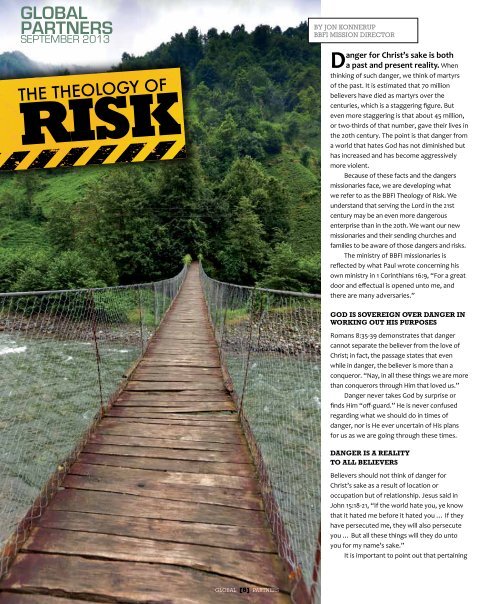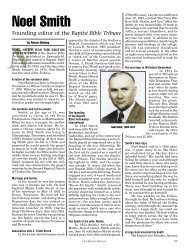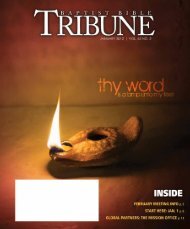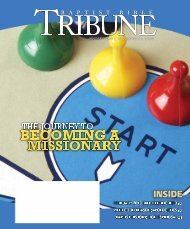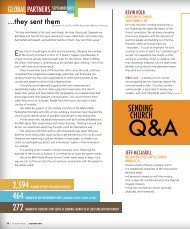THE THEOLOGY OF - Baptist Bible Tribune
THE THEOLOGY OF - Baptist Bible Tribune
THE THEOLOGY OF - Baptist Bible Tribune
- No tags were found...
You also want an ePaper? Increase the reach of your titles
YUMPU automatically turns print PDFs into web optimized ePapers that Google loves.
BY T.S. LONGBBFI ASSOCIATE MISSION DIRECTORRISKAND SUFFERING“Blessed are they which are persecuted for righteousness’sake: for theirs is the kingdom of heaven. Blessed are ye,when men shall revile you, and persecute you, and shall sayall manner of evil against you falsely, for my sake. Rejoice,and be exceeding glad: for great is your reward in heaven:for so persecuted they the prophets which were beforeyou.” Matthew 5:10-12As Jesus explained the cost and suffering ofbeing disciples, He was looking forward intothe events they would encounter, giving themdirection on how to meet suffering, knowing thatothers before them had also faced persecution.Being blessed as we are in America, it may be difficultto understand the suffering that our missionaries around theworld encounter each day. Many Christians believe a doorshut in the face on visitation or a mix up in a drive thru orderbrings us to the perils of persecution and suffering. Yet, oureyes were opened greatly as we arrived in the Middle Easteleven years ago. In that time, we have personally witnessedand endured events and sufferings that are uncommonto the western Christian. We did not see these events asspectacular; just a part of our calling as missionaries.One occasion involved our evangelism outreach into thevillages in the south as we were starting a new church. Two ofour teams encountered Muslims who had been antagonizedby the local imam (Muslim leader) to attack our groups whowere doing house visits. Through the mosque speakers, heencouraged as many as 50 men to throw stones at our group,forcing us to retreat back to the van. In all, we had five whowere injured and had to go to the local hospital for medicalcare. Once we received care, we went back into the villageand were able to complete the work we had started.Not all missionaries would have as extensive a record ofsuffering as Paul gave in 2 Corinthians 11:25-27. Being beaten,robbed, and shipwrecked are but a few of his sufferings. Yet,our missionaries could each give stories of suffering theyhave experienced while on the foreign field. Many of thoseevents will never be shared or revealed openly, but theirsuffering is real.Suffering and difficulties are part of the call to blessingthat Jesus spoke of. Samuel Zwemer, who 100 years agospent his life in ministry to see Muslims come to Christ, stated,“Frequent setbacks and apparent failure never disheartenedthe real pioneer. Occasionally martyrdoms are only a freshincentive. Opposition is a stimulus to greater activity. Greatvictory has never been possible without great sacrifice.”We should never let our personal suffering dictate theextent or desire of our calling to go. Like Christ, sufferingshould be faced knowing that glory goes to the Father andour suffering is not a sacrifice, but a privilege in which we canrejoice.Global [12] Partners
Global [13] Partners
not only spoke of following Him, but he tookon that responsibility. Of course, at that timeneither he nor any of us expected how far hewas going to be required to go. But he waswilling to go.”Martin Burnham kept that attitudethroughout the 376 days he and his wife,Gracia, were held captive by the Abu Sayyafterrorist group.Just before a Philippine military raid onthe kidnappers that led to Martin’s death andGracia’s freedom, the two huddled together ina hammock under a makeshift tent. They hadbeen thinking that there would be a chancethat they would not make it out alive. Martinsaid to Gracia, “The <strong>Bible</strong> says to serve the Lordwith gladness. Let’s go out all the way. Let’sserve Him all the way with gladness.”The two then prayed in their hammock,recited scripture verses to each other, andsang. They lay down to rest. The rescue assaultbegan and bullets began to fly, puncturingGracia’s leg and Martin’s chest.We heard a pastor say recently, “We livein a day of easy believism. If you want to go toheaven, raise your hand for Jesus, live howeveryou want, and at the end, He’ll say, ‘Well done.’[Actually, between your conversion and yourresurrection is your discipleship. It’s growing,maturing in love, devotion, and commitmentto Christ.”Jesus says, “I’m God. If you want to followme, people will hate you and you might die.”That’s the cost of discipleship.We have read in the history of modernmissions about the Student VolunteerMovement of more than a century ago. YoungNorth Americans were rallying to take thegospel around the world. It is said that whenthey would ship missionaries out, they wouldpack all of their belongings in a coffin. It wasa very clear way of saying, “I’m going to die.I’m going to go talk about Jesus until I die.That might be a short while, that might bea long while, but it will happen.” And theywould write a final farewell letter and leaveit to someone they loved or leave it with themissions organization. And upon their death, itwould be delivered and read by that person.One young lady, having gone to Africa, leftthe letter with her pastor:“Dear Pastor, You should only be openingthis letter in the event of my death. When Godcalls, there are no regrets. I’ve tried to shareChet and Brenda Bitterman were new Wycliffe missionaries in Colombia at the sametime Sharon and I were new BBFI missionaries in Ecuador. We remember followingthe event in which Chet was abducted by terrorists and 48 days later was killed, onMarch 7, 1981. Bernie May was the U.S. Director of Wycliffe at the time. He wrote:Why we didn’t give inWho made the decision that we would not knuckleunder to the terrorists, even if it should mean that ChetBitterman would be killed?We did, the members of the Summer Institute ofLinguistics and the Wycliffe <strong>Bible</strong> Translators. We didit years ago, before anyone had been captured. Wedid it, aware that someday our hearts might ache withgrief for a dearly-loved colleague. Above all, we did itwith the calm assurance that we acted according to thewill of God and in the tradition of those first-centuryChristians who lived and died by the refreshingly simpleimperative: “We must obey God rather than men”(Acts 5:29).This is not the glib recital of an obsolete slogan. It isGlobal [15] Partnersmy heart with you as much as possible, myheart for the nations. I wasn’t called to a place.I was called to Him. To obey was my objective.To suffer was expected. His glory, my reward.The missionary heart cares more than somethink is wise, risks more than some think issafe, dreams more than some think is practical,expects more than some think is possible. Iwas not called to comfort or to success, but toobedience. There is no joy outside of knowingJesus and serving him. I love you and mychurch family. In his care, Karen.”The mental image of a missionary packinghis or her coffin for their journey speaksvolumes about their commitment. I wonderif we are losing sight of our mission. I wonderif our passion for the fulfillment of the GreatCommission is waning. I wonder if in ourchurches “Missions” has become a goodcategory to include on our websites and in ourbudgets. Maybe it has become a hobby for ourspare time and extra money.Jesus said it clearly — only through losingyour life can you find it.Take up your cross, pack your coffin, andchange the world.the deliberate resolve to act according to the prioritiesGod has declared.Having experienced the biting pain of Chet’s longcaptivity and final execution, are we still committed toour position of no capitulation to terrorists? Has ourdecision stood the test? Though lips quiver and eyesblur with tears, we declare again our unwavering faithin our Lord Jesus Christ. He demonstrated for all to seethat the ultimate sacrifice, the laying down of one’s life,when made in the will of God, is the greatest weaponwe can wield in our battle against evil. “They overcamehim (i.e. the devil) by the blood of the Lamb and by theword of their testimony; they did not love their lives somuch as to shrink from death” Revelation 12:11.Used by permission from Wycliffe <strong>Bible</strong> Translators.[
RISKAND CROSS-BEARINGBY JAMES G. SMITHBBFI ASSOCIATE MISSION DIRECTORWhat did Jesus mean when Hesaid, “Take up your cross andfollow me?” (Matthew 16:24; Mark 8:34;Luke 9:23)Let’s begin with what Jesus didn’t mean.Many people interpret “cross” as someburden they must carry around in their lives: astrained relationship, a thankless job, a physicaldeformity, an unpleasant mate. With selfpityingpride, they say, “That’s my cross I haveto carry.” Such an interpretation is not whatJesus meant when He said, “Take up your crossand follow me.”When Jesus carried his cross up Golgothato be crucified, no one was thinking of thecross as symbolic of a burden to carry. To aperson in the first century, the cross meant onething and one thing only: death by the mostpainful and humiliating means human beingscould develop.Two thousand years later, Christianscorrectly view the cross as a cherished symbolof atonement, forgiveness, grace, and love.But in Jesus’ day, the cross representednothing but torturous death. Because theRomans forced convicted criminals to carrytheir own crosses to the place of crucifixion,bearing a cross meant carrying their ownexecution device while facing ridicule along theway to death.Therefore, “Take up your cross andfollow me” means being willing to die inorder to follow Jesus. It involves self-denial.It’s a call to absolute surrender. After eachtime Jesus commanded cross-bearing, hesaid, “For whosoever will save his life shalllose it; but whosoever will lose his life for mysake, the same shall save it. For what is a manadvantaged, if he gain the whole world, andlose himself or be cast away?” (Luke 9:24-25). Although the call is tough, the reward ismatchless.Galatians 2:20, “With Christ I have beencrucified.” In the Greek sentence, “with Christ”is placed first for emphasis. The verb (a perfectpassive indicative) implies that somethinghappened in the past with abiding results andwas accomplished by an outside agent. It is thefocus of Romans 6 and 7.It is important to remember that oncewe have died with Christ, we are alive toGod. “Nevertheless, I live!” This conceptGlobal [16] Partners
apprehensive, having been a revenge-basedsociety for generations.Taking the initial risk, while difficultand certainly frightening, was followed bylifelong submission to the perfect will of God.For sweet Rachel, that meant 36 years ofjungle living, serious health issues, languagedevelopment, <strong>Bible</strong> translation, care giving,and self-sacrifice. But her deep commitment toChrist overflowed in a joyful countenance.To make the wrong choice and spendone’s life avoiding risks would surely result intruly a sad and fruitless life. A byproduct ofavoiding risk is that the risk-avoider tends tofullness of joy are not necessarily connected tothe calendar.Have you ever heard this phrase? “Thesafest place in the world is in the middle ofGod’s will.” That is downright goofy. Actually,sometimes being where God wants you tobe and doing what God wants you to do isnot at all safe. But risk-taking, cross-bearingobedience is the way to fulfillment.Missionary, pastor, church member, allof us as Christ-followers must count the cost,bear the cross, take the risk. Obedience is thepath we must choose.[Have you ever heard this phrase? “The safestplace in the world is in the middleof God’s will.” That is downright goofy.Actually, sometimes being where God wants you to beand doing what God wants you to do is not at all safe.[is emphasized over and over again as ourresponsibility to walk as he walked; andthat we ought to walk worthy of the callingwherewith we have been called.(Ephesians. 4:1,17; 5:2)Once we know Christ in free forgiveness,it is important that we live a life of responsibleservanthood.In the well-known parable of the talents inMatthew 25, we find two extremes: successfulrisk-taker and worthless risk-avoider. Prettymuch, those are our only choices — risk-takeror risk-avoider!The Old Testament is full of stories of risktakers.Moses at the Red Sea. Joshua outsideJericho. Elijah on Mount Carmel. Daniel havingmorning devotions.It is obvious that Jesus values and rewardsrisk-taking.If we follow Him, He will lead us throughour adventure of faith. If you are obedientto the Lord, you know that this new life isindeed an adventure of faith. Risk is born outof our intimate walk with the Savior. Risk isdemanded of the servant of Christ.Is it possible that some of us are trying tofind a “comfort zone” instead of the “dangerzone?”Our dear friend, Rachel Saint, told us onmore than one occasion of the courage thatwas necessary to go into the Waorani tribethat had killed her brother and his four friends.The Waorani themselves were fearful andbe judgmental. To those on the front lines,risking everything, the risk-avoider looks likeone who in the comfort and security of hissuburban home, sits on his couch and criticizesothers who took some risks and got injured,heartbroken, or attacked. We like what onepastor said, “Jesus didn’t say, ‘Pick up yourmattress and follow me.’ He said, ‘Take up yourcross!’”Is it possible to be a true Christ-followerwho avoids risks? We think not. Courage isnecessary. Courage is demanded.In a video titled, “Letter to Zac” producedas he faced death, Zac Smith encouragedChristian young people to “choose theharder path” (http://www.hello-righton.com/2009/08/13/letter-to-zac-video). When weface the reality of the brevity of life, the risksseem trivial. The abundance of life and theA great deal more failure is the resultof an excess of caution than of boldexperimentation with new ideas. Thefrontiers of the kingdom of God werenever advanced by men and women ofcaution. -Oswald SandersGlobal [17] Partners


